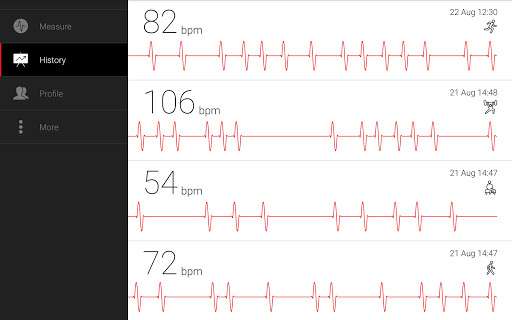
The technicians respond via the app’s messaging tool to notify you of any abnormalities in your heart rhythm and whether you should visit a doctor. Then, click "Submit For Review." A team of trained cardiographic technicians will then analyze your ECG/EKG anytime, anywhere.
#Cardiograph for android note skin#
The technology involves a light source and a photodetector at the surface of skin to measure variations in blood circulation.Īfter taking the reading, you can open the ReadMyECG app on your smartphone and view your ECG/EKG analysis. According to a review published in the International Journal of Biosensors & Bioelectronics in August 2018, PPG is a noninvasive, uncomplicated, and inexpensive optical measurement method used for monitoring heart rate. For example, the Apple Watch contains optical heart sensors that measure your heart rate using photoplethysmography (PPG) technology. These include the Apple Watch, Samsung Galaxy Watch, Fitbit, Withings Scanwatch, and KardiaMobile. Want to determine your heart rate quickly? This app can take an ECG/EKG in as little as 30 seconds using any wearable smart device that can measure your heart rate. Here are five that can help you and your doctor better manage your heart condition. Nevertheless, apps hold tremendous potential for improving afib detection and management.

Some may only need to use an app when symptoms occur, while others may take a reading once or twice a day as part of a treatment plan with their doctor. Rouse adds that how frequently you need to measure your heart rate will vary based on the individual. Only smartwatch devices have the ability to monitor continuously which is more useful in clinical practice.” Dr. Vincent’s Medical Center in Bridgeport, Connecticut, says, “These apps do not monitor continuously, which is a major limitation. Charles Rouse, MD, a cardiac electrophysiologist with St. While mobile apps can work great for taking a quick measure of your heart rhythm at home, there are some limitations. In the case of atrial fibrillation, the earlier you detect an issue, the more likely the condition can be successfully treated to prevent an event such as a stroke,” says Emerson Perin, MD, a cardiologist and medical director at the Texas Heart Institute in Houston. For example, when the heart beats irregularly, it can form blood clots. “Apps can help alert patients to changes in their heart rate that may indicate a looming problem.

You can use these apps to detect any irregular heart rhythms or signs of afib, then use that information to meet with your doctor, who can run tests and potentially diagnose your afib. In some cases, your doctor may request a heart monitor be worn for anywhere from a few days to a month to monitor your heart rhythm in your daily life.īut now, downloadable mobile apps have improved the screening process and management of afib, according to a clinical review published in the journal Heart Rhythm O2 in April 2020. Your doctor will then give you a physical exam that involves listening to your heart rhythm and lungs with a stethoscope, checking your pulse and blood pressure, examining your feet and legs for swelling, and checking your thyroid gland for enlargement.Īfter the physical exam, your doctor may run tests including electrocardiograms (ECG or EKG), echocardiograms, and blood tests to confirm a diagnosis. To diagnose afib, your healthcare provider will ask you questions regarding your diet, physical activity, family history, afib symptoms you’ve noticed, and if you have any risk factors for the condition, such as heart disease, high blood pressure, diabetes, thyroid disease, obesity, and alcohol consumption. Receiving an afib diagnosis can be alarming for you and your family. Common symptoms include:Īccording to the National Heart, Lung, and Blood Institute, afib can also occur without symptoms and lead to serious, potentially life-threatening complications, such as blood clots and stroke. Atrial fibrillation (afib) is a common heart condition that affects over 2.7 million Americans and occurs when your heartbeat becomes rapid or irregular, according to the American Heart Association (AHA).Īfib is caused by the upper and lower heart chambers not working together properly due to abnormal electrical signaling.


 0 kommentar(er)
0 kommentar(er)
